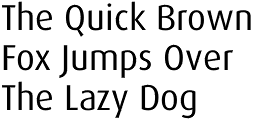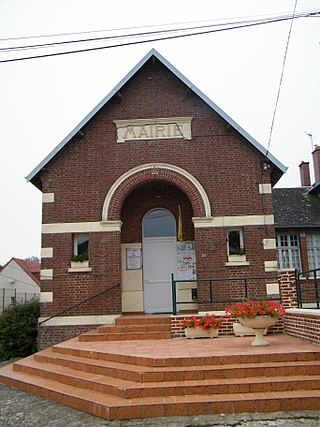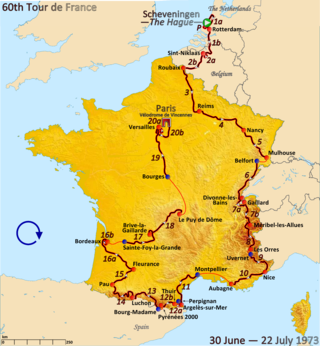Related Research Articles

The Romance languages, also known as the Latin or Neo-Latin languages, are the languages that are directly descended from Vulgar Latin. They are the only extant subgroup of the Italic branch of the Indo-European language family.

Modern English is written with a Latin-script alphabet consisting of 26 letters, with each having both uppercase and lowercase forms. The word alphabet is a compound of alpha and beta, the names of the first two letters in the Greek alphabet. Old English was first written down using the Latin alphabet during the 7th century. During the centuries that followed, various letters entered or fell out of use. By the 16th century, the present set of 26 letters had largely stabilised:

Montauban-de-Picardie is a commune in the Somme department in Hauts-de-France in northern France. Its inhabitants are called Montalbanais in French.

The Vélodrome de Vincennes is a cycling stadium in the Bois de Vincennes, Paris, France.

The 1973 Tour de France was the 60th edition of the Tour de France, one of cycling's Grand Tours. It took place between 30 June and 22 July, with 20 stages covering a distance of 4,090 km (2,541 mi). Eddy Merckx, winner of the previous four editions, did not start the 1973 Tour, partly to avoid angry French fans and partly to please his sponsor; instead he rode and won the 1973 Vuelta a España and the 1973 Giro d'Italia. In his absence, Luis Ocaña dominated the race by winning four mountain stages and two time trials. The result being a margin of victory exceeding 15 minutes.

Hendrikus Andreas "Hennie" Kuiper is a Dutch former professional road racing cyclist. His career includes a gold medal in the Olympic road race at Munich in 1972, becoming world professional road race champion in 1975, as well as winning four of the five "Monument" classics. He rode the Tour de France 12 times, finishing second twice and winning the stage to Alpe d'Huez on two occasions. Kuiper, Ercole Baldini, Paolo Bettini and Remco Evenepoel are the only riders to have won both the Olympic road race and the world professional road race.

Herman Vanspringel, also spelled Herman Van Springel, was a Belgian road racing cyclist, from Grobbendonk, in the Flemish Campine or Kempen region. He achieved podium finishes in all three of the grand tours with second place in the 1968 Tour de France and 1971 Giro d'Italia, and third place in the 1970 Vuelta a España. He wore the maillot jaune during four stages of the 1968 Tour de France and for three stages in 1973.

Georges Pintens is a former professional road bicycle racer from Belgium who excelled at one-day classic races during the 1960s and 1970s.
The 1973 Giro d'Italia was the 56th running of the Giro, one of cycling's Grand Tours. It started in Verviers, Belgium, on 18 May, with a 5.2 km (3.2 mi) prologue and concluded with a 197 km (122 mi) mass-start stage, on 9 June. A total of 140 riders from fourteen teams entered the 20-stage race, that was won by Belgian Eddy Merckx of the Molteni team. The second and third places were taken by Italians Felice Gimondi and Giovanni Battaglin, respectively.

Bienvillers-au-Bois is a commune in the Pas-de-Calais department in the Hauts-de-France region in northern France.

Bourlon is a commune in the Pas-de-Calais department in the Hauts-de-France region in northern France.

Fleurbaix is a commune in the Pas-de-Calais department in the Hauts-de-France region of France.
Didier Henriette is a French professional racing cyclist who was active as an elite track cyclist between 2003 and 2008. In 2007 and 2008, he competed as part of the French Cofidis sprint cycling team in the UEC European Track Championships and the Los Angeles Team Sprint Competition.

Érôme is a commune in the Drôme department in the Auvergne-Rhône-Alpes region in southeastern France.

Maricourt is a commune in the Somme department in Hauts-de-France in northern France.
Bernard Delemotte was a French underwater diver and photographer who was a member of the oceanographic research team of the Cousteau Society, founded by Jacques-Yves Cousteau. He participated as a diver, underwater cameraman and expedition team leader in various Cousteau Society's projects such as the ones featured in the television series The Cousteau Odyssey filmed between 1977 and 1982.
The Base Mérimée is the database of French monumental and architectural heritage, created and maintained by the French Ministry of Culture. It was created in 1978, and placed online in 1995. The database is periodically updated, and contains more than 320,000 entries as of October 2020. It covers religious, domestic, agricultural, educational, military and industrial architecture, and is subdivided into three domains: historical monuments, general inventory, and architecture. The database was named after writer, historian and inspector-general of historical monuments Prosper Mérimée, who published the first survey of historic monuments in 1840.
The 1976 Critérium du Dauphiné Libéré was the 28th edition of the cycle race and was held from 24 May to 31 May 1976. The race started in Grenoble and finished in Montélimar. The race was won by Bernard Thévenet of the Peugeot team.
The 1975 La Flèche Wallonne was the 39th edition of La Flèche Wallonne cycle race and was held on 17 April 1975. The race started and finished in Verviers. The race was won by André Dierickx of the Rokado team.
The 1972 Tour de Suisse was the 36th edition of the Tour de Suisse cycle race and was held from 15 June to 23 June 1972. The race started in Zürich and finished in Olten. The race was won by Louis Pfenninger of the Rokado team.
References
- ↑ "Accès équipes Rokado" (in French). Mémoire du cyclisme. Retrieved 10 February 2017.